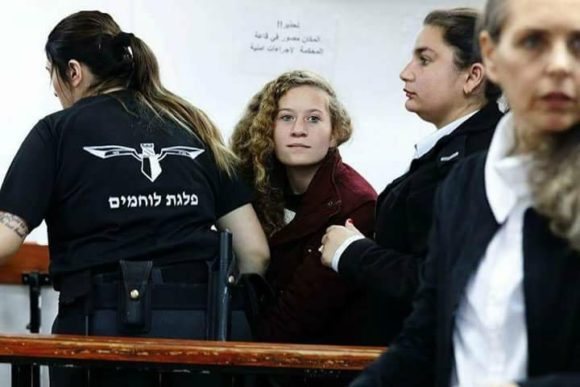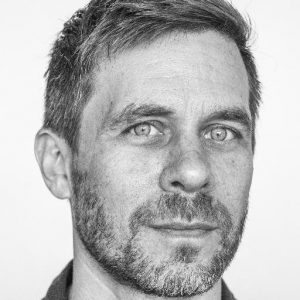Back in 2011 an 11-year-old Ahed Tamimi and her young cousin, Marah, “scampered” to the front of another peaceful march in their home village of Nabi Saleh, Occupied Palestine, the American writer Ben Ehrenreich relates. The two were joining weekly protests against the Israeli settler/colonists who had stolen much of their land, seized their spring, and built a fish pool next to it. Israeli soldiers, there only to protect the settler/colonists, tossed stun grenades at the girls’ feet, and then violently drove the demonstrators away.
“Ahed was her usual stoic self” all through the tense day, Ehrenreich writes. But then, that night, “she had nightmares — she talked in her sleep until morning, waking again and again in panic and fear.” Her mother, Nariman, told Ehrenreich, “I don’t know what to do, but raise my children to be strong.”

16-year-old Ahed Tamimi in Israeli military court (Photo: Tali Shapiro/Twitter)
Ahed Tamimi, now 17, has become one of the most well-known Palestinians in the world. She is still in an Israeli military jail, more than 3 months after she slapped an Israeli soldier who had invaded her family home. Israelis and their apologists sneer at her as “Shirley Temper,” and some even suggest she and her family are actors.
Fortunately, the truth about Ahed is in Ben Ehrenreich’s impressive book, The Way to the Spring: Life and Death in Palestine, which appeared in 2016. He spent months in Nabi Saleh, including stays in the Tamimi home, and his first-hand account is a fascinating, lengthy description of this remarkable young woman and her remarkable family. Ehrenreich’s account of the injustice of occupation is even more compelling because it is understated; the facts speak for themselves.

Ben Ehrenreich
Ahed Tamimi appears regularly in Ehrenreich’s description of the resistance in Nabi Saleh. Her parents, Bassem and Nariman, are leaders, and her entire extended family has paid a high price for their stubborn refusal to give up their land and its spring. Bassem has been arrested more than a dozen times, and spent 3 years in jail without trial. In 2012, Israeli soldiers killed Ahed’s maternal uncle, Rushdie, with an M-16 automatic weapon. That same year her older brother, Waed, was arrested right alongside her, and a video of her trying to protect him went viral; Ehrenreich reports that Waed later appeared in military court “covered in bruises and scabs.” Nariman Tamimi has been repeatedly arrested and beaten, and then in 2014 shot with a live bullet and injured so badly that she had to walk with a cane for more than a year.
But we learn more about Ahed Tamimi than her activism. She watches fantasy films on TV with her 3 brothers, and she likes to play video games. She was disappointed she could not have a party to celebrate her 12th birthday, because the village was mourning the death of her uncle, but then her mother gave in. “Ahed’s cake was drizzled with chocolate and frosted with a sugary yellow-haired Cinderella in headphones,” remembers Ehrenreich, who was one of the guests.
In one of the most touching scenes, a brief loosening of the occupation allows some of the Tamimi family to visit the sea at Acre. The Mediterranean is only 2 hours west of Nabi Saleh, but most of the children have never seen it. Ehrenreich accompanies them, and reports that even after nightfall, the children will not leave their first beach: “The kids were in the water, shrieking and splashing and paddling about. It was dark by the time they slumped back to the cars, wet towels on their bare, skinny shoulders, shivering a little and smiling still.”
Ehrenreich’s account does also include valuable background information:
* The number of Jewish settler/colonists in the West Bank tripled since the “peace process” started in 1993, to more than 350,000 by 2016 (excluding East Jerusalem).
* Some 40 percent of all Palestinian men have done time in Israeli jails.
* Some 99.74 percent of the Palestinians tried in Israeli military courts are found guilty.
Today, Ahed Tamimi still sits in an Israeli military prison. She and her family want her eventual “trial” to be public, but the Israeli occupation authorities just refused, claiming they wanted to protect her “privacy.”
Ahed’s mother, Nariman, tells Ehrenreich what it was like to watch her wounded brother, Rushdie, dying right in front of her while an Israeli soldier refused to call for medical aid. She said she wanted to kill the soldier who had just shot her brother: “But I knew that I had to be stronger than that. I had to be stronger than them. Why? Why is it required of me to be more humane than they are?”
Source Article from http://mondoweiss.net/2018/03/remarkable-portrayed-ehrenreichs/
Related posts:
Views: 0
 RSS Feed
RSS Feed

















 March 22nd, 2018
March 22nd, 2018  Awake Goy
Awake Goy  Posted in
Posted in  Tags:
Tags: 
















